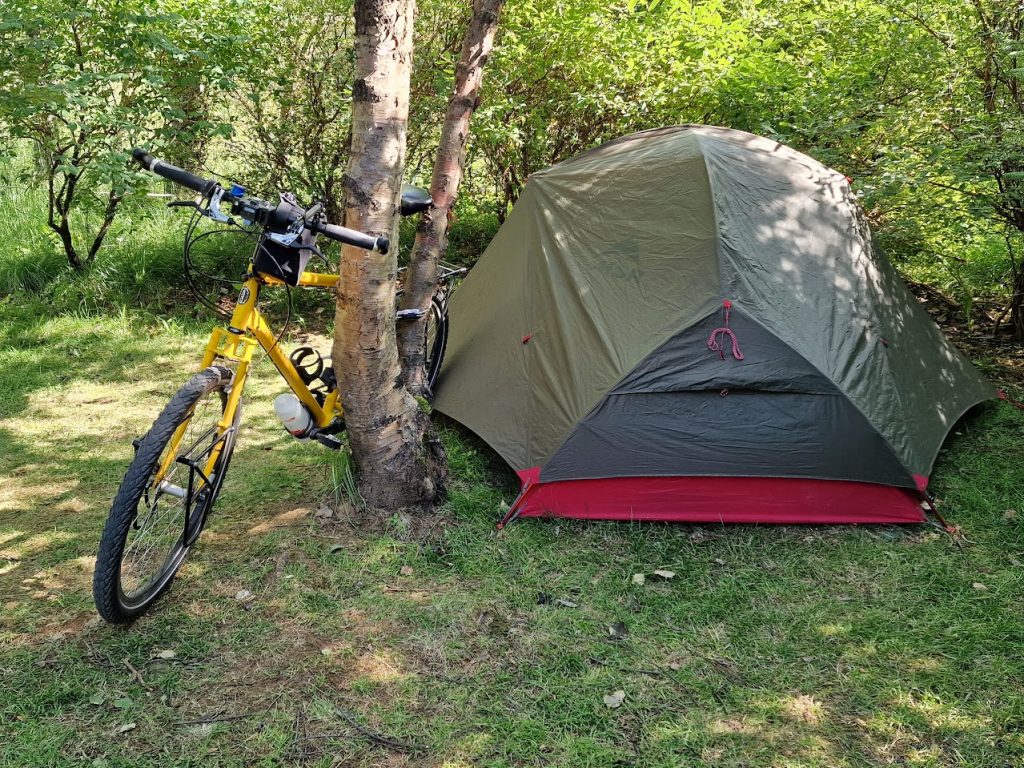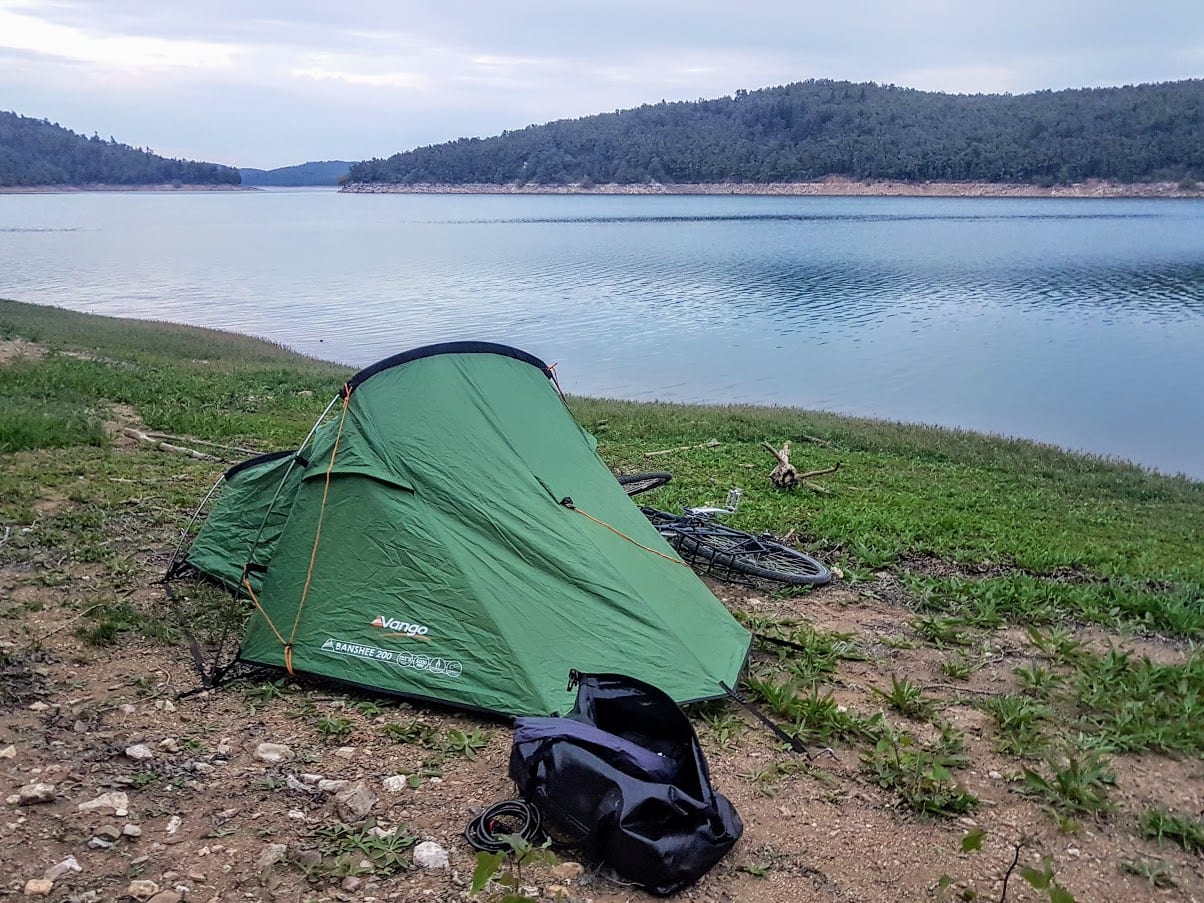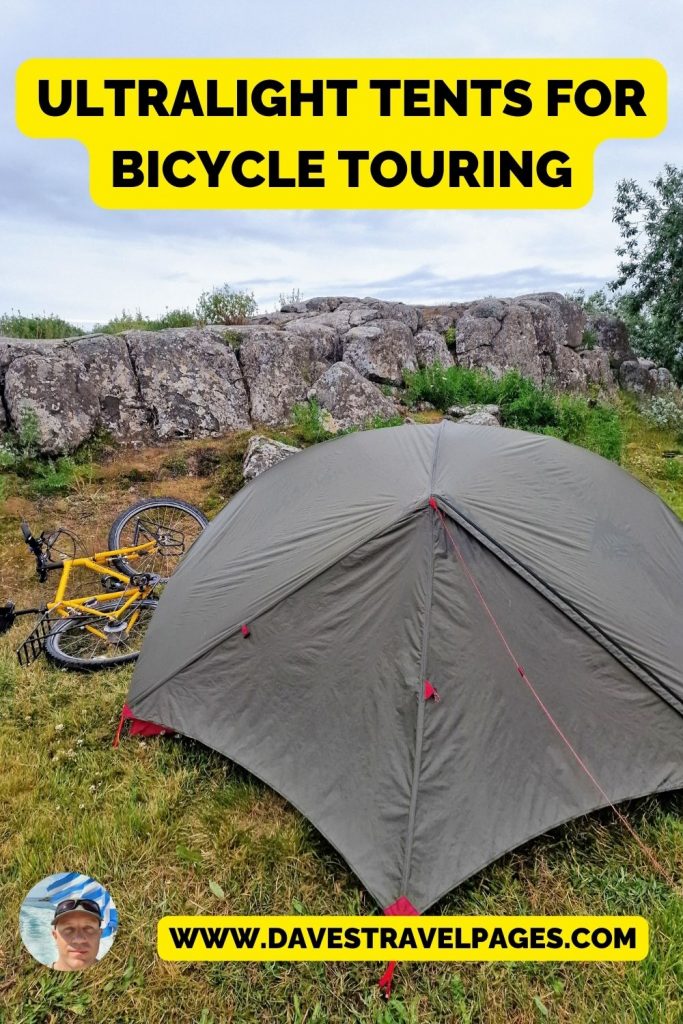Are you searching for the perfect lightweight tent for bike touring or other outdoor adventures? Here are ten tips on what to look for when choosing which lightweight tent to buy.

Why Ultralight Tents Are Ideal For Bikepacking
Ultralight tents are a popular choice among bicycle tourers and bikepackers who prioritize weight savings in their gear. These tents are specifically designed to be lightweight, with materials and construction techniques that minimize weight without compromising on essential features.
Ultralight tents typically use ultra-thin fabrics, lightweight poles, and innovative design elements that reduce the overall weight while maintaining structural integrity and weather resistance.
Whether you're planning a multi-day backpacking trip or simply want to save weight in your camping setup, an ultralight tent is an excellent investment for any outdoor enthusiast who values portability and efficiency without sacrificing comfort or safety.
Choosing a lightweight tent for bikepacking
Lightweight tents are perfect for cycle tourists, backpackers, bikepackers and outdoor enthusiasts.
Get the right backpacking tent and you'll be able to sleep in a nice dry place at night, no matter how many miles you've traveled that day!
Buy the wrong one, and you might curse every single extra gram in weight you are carrying whether cycling up hill after hill or hiking through the mountains.
What to look for when buying a lightweight tent
This blog post will give you some pointers on what to look for when buying a new lightweight tent, as there are many different things to consider, such as :
- How much weight do you want to carry?
- What is your budget for the tent?
- How long do you want the tent to last?
- How easy is the tent to set up?
This guide aims to answer most of these questions, and perhaps a few you haven't thought of!
1. What is the weight of the tent?
Everyone's definition of what a lightweight tent is will differ somewhat. However, the general consensus is that a lightweight tent should be under three pounds.
A good quality one will weigh in at around two and half to four lbs – so it's worth investing some time into finding out what weight you're comfortable with! If your budget allows for something lighter than this then go ahead; if not don't worry.
You should note that how the packaged weight of a tent is measured differs from brand to brand. Some will include the pegs it is supplied with, others will not. Many tents do not come with a footprint, meaning that not only do you need to buy it separately, but you also need to add in this additional weight to your calculations.
MSR Elixir 1-Person Lightweight Backpacking Tent
✓One person tent for solo backpackers and campers
✓Unique pole geometry optimizes headroom and fits one large mat; adaptable rainfly allows for excellent views; built-in gear lofts and glow-in-the-dark zipper pulls enhance livability
✓Includes an MSR Elixir footprint that allows for a lightweight fast & light setup with rainfly
✓Freestanding system features color-coded poles, clips and webbing, Plus red vestibules for fast and easy setup
✓Mesh and solid fabric panels offer ventilation, warmth and priv
Also available in your local Amazon store. We may earn a commission from purchases you make after clicking links on this site.
2. What is the pack size of the tent
If you're on a bike tour, the pack size of the tent might not make much difference. You'll tend to either put it in a pannier, or strap it on to the rear rack of the bike. If you are backpacking or hiking though, packs size of the tent may be a key issue.
The top end lightweight tents may pack down to around the size of a loaf or baguette. For example, the Terra Nova Laser Pulse Ultra 1 has a minimum weight of just 450g but a tiny pack size of only 30cm x 9cm.
Of course, the practical upshot of this is that tent capacity is limited and you won't have much room in the actual tent itself, which brings us on to the next point.
3. How big do you want the tent to be?
Most people researching lightweight tents will be looking for one person tents. These tend not to be too big on the inside though. Personally, as I'm 6 foot, I prefer a 2 person tent so I have a little more interior space for myself and my gear.

This of course means that the weight I carry will be a little more than if I bought a one person tent. If you end up having to spend hours inside the tent in high winds on a stormy night and / or day, you might appreciate the extra space. This is something you'll have to consider.
4. Is a freestanding tent better?
Overall, freestanding tents offer a lot of advantages when camping compared to non freestanding tents.
The main one, is that you can set your tent up on any hard ground such as on concrete, wooden decking, and more rocky ground.
Sure, it's better to be able to peg your tent in, but there may be circumstances where it isn't possible.
5. Durable construction with quality fabrics
The tent should be made from quality fabrics, and the construction needs to have been done well. This is because you want your lightweight backpacking or bike packing tents to last a long time so you get your maximum value for money!
Cheaper tents that rip in the first slight breeze are no use to anyone. Also, try to get a tent where the pole structure is durable and they can be easily replaced or repaired should they snap.
The longer you travel for, and more you use the tent for camping, the likelier it is you'll snap one and need to get hold of more poles at some point.
6. Is the tent waterproof?
It goes without saying that your tent is going to need to be waterproof! You don't want to be out in the rain, or worse still a storm and have your tent leak.
Make sure you check that it is waterproof before buying, and also read a few reviews from people that have previously bought the model of tent you are interested in. You might need to buy a ground sheet separately.
7. Easy set up and take down
If you're at the end of a long day and the weather is starting to look grim, you'll want to be able to set up your tent quickly. In all fairness, nowadays, most tents can be set up within just a few minutes, but it is something to keep in mind.
8. What colour do you want your tent to be?
If you plan on doing a lot of wild camping, you probably don't want a bright orange tent. On the other hand, if you want to buy a lightweight tent for emergency use only, perhaps a bright colour is exactly the thing you are looking for.

In my experience, a dark green or grey is a good colour if you want to wild camp a lot.
9. Will it stand up to strong winds?
If you are planning on adventuring in extreme conditions, or want a tent suitable for all elements, then this is something you need to look at.
If you need a tent that will stand up to snow loads, heavy rains, or other extreme weather conditions such as hail, it might be worth carrying a little extra weight in the form of a heavier but sturdier tent.
10. Does the tent have mesh windows?
These are useful as they allow air to circulate through them when they're unzipped during warmer months but still provide protection from bugs at night when zipped closed.
You might also prefer a tent with a removable outer later, and just sleep in the mesh inner in particularly hot and humid countries.
Recommended Lightweight Tents for Bike Touring
Tent shopping but not sure what model or brand to go for? Here's a few of the most recommended lightweight tents to consider buying before your next bicycle touring trip.
Remember, the lighter and more exotic the tent, the more expensive it will be!
- MSR Hubba NX 1 Tent
- Big Agnes Fly Creek HV UL Ultralight Backpacking Tent
- Nemo Hornet Ultralight Backpacking Tent
- MSR Backpacking-Tents MSR FreeLite Ultralight Breathable Backpacking Tent
Bikepacking and Backpacking Tents
Readers looking to get the right tent and outdoor gear that balances weight and utility often ask themselves questions similar to:
What is a good weight for a tent?
The tent's weight consists of the tent poles and tent walls, as well as any additional footprint and pegs. A good tent weight to aim for is 2.5 pounds (1.13 Kg) to 3 pounds (1.36 Kg) per person.
Do I need an ultralight tent for car camping?
If you are car camping, the pack weight of a tent is not normally an issue. Instead of buying ultralight models, it would be better to buy a slightly heavier and sturdier tent with plenty of extra storage space and perhaps even the ability to stand upright inside.
What is considered lightweight tent?
You can calculate the weight of a tent on a per person basis, which is especially useful if the tent is going to accommodate more than one person. A lightweight tent is one that weighs less than 2 pounds per person, whereas an ultra-lightweight tent is one that weighs less than 1 pound per person.
What should I look for when buying a tent?
As with all the gear you buy for spending time in the outdoors, a well constructed tent made out of good materials is essential. I personally prioritize a tent's waterproof features and weather resistant attributes over saving a few grams in weight.
How long do most backpacking tents last?
This really depends on the tent materials such as the waterproof material and fiberglass poles than anything else. I've had some tents last me years, while others tent models have barely gotten me through more than a couple of backpacking trips.
Planning a bike tour or camping trip? You might also want to read:
- 7 Reasons to take a Powerbank on your next Bike Tour
- How to choose a camp stove for bicycle touring
- Top Pillows for Camping
- Duct Tape Bike Repairs
- Touring bike accessories and gear
- How to stay cool camping in a tent in the summer
- How to Stay Comfortable and Warm Sleeping Outdoors
- Camping captions for Instagram

Also read:
 – Dave Briggs
– Dave Briggs
Dave has cycled around most of the world on different bikepacking tours, and has literally spent years of his life sleeping in tents! His longest bicycle touring adventures include riding from Alaska to Argentina, and England to South Africa.
In addition to this blog post on what to look for in a lightweight tent, he's written many other guides about bike touring.
Follow Dave on social media for travel, adventure and bike touring inspiration:
